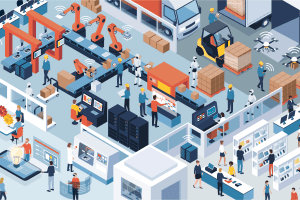How has COVID enabled a positive change to the future of work?

Brandon Oliveri-O’Connor, Director of the UK&I, Procore, reveals why there are some positive outcomes from the global pandemic and how it is shaping the future of work.
All industries have experienced a turning point in how they work during the last six months. And, what we have seen is that industries typically viewed as laggard in technological adoption are starting to catch up with the times and even excel as they found that previous ways of working didn’t cut it. One notable industry increasingly realising the benefits of digitalisation is construction. Due to its work being conducted predominantly on site – and therefore face-to-face – it is an industry which has been one of the hardest hit by COVID-19. Yet through the implementation of digital solutions, many in the sector have been able to continue working during the pandemic, and as a result, now view technology as a positive tool to navigate the future.
In fact, our recent research highlights that over half (52%) of UK construction managers surveyed are feeling empowered, applying positive changes to the way they work.[1] We imagine this is the same for many other industries, beyond construction.
Lockdown measures forced organisations to find new ways to achieve business continuity, and technology provided a beacon of hope for many – from offering work management platforms to video conferencing tools. Amidst the pandemic, organisations which adopted the appropriate technologies and integrated them into their operations not only managed to maintain 4 but also improved overall performance. So how has COVID, which catalysed the use of technology, enabled a positive change to the future of work?

Prioritising health and safety
Aside from the benefits from a financial standpoint, digital transformation holds numerous advantages in health and safety. This is particularly critical at this time as employers try to implement a safe return to work. Whether your business is based in the office or on a construction site, reducing potential contact for employees without compromising productivity has been a challenge. Accordingly, digital transformation has proved instrumental in allowing organisations to avoid face-to-face meetings without severing communication. The use of videoconferencing and platform technologies has facilitated seamless communications even as teams have become more distributed and remote.
Such successes can be seen in the likes of the Elliott Group who, thanks to their implementation of platform technology, were able to continue work throughout the pandemic. While a lot of companies had to shut down operations, they maintained momentum thanks to easy communication and collaboration. The ability to host technical discussions, make observations and continue conversations through the pandemic overcame most of the barriers lockdown was expected to have on their project in one Irish hospital while expanding its ICU capacity.
Connection is king
The pandemic and examples such as Elliott Group highlight the importance of providing teams with the right tools to continue their work as efficiently and productively as possible. One platform technologies hold a particular advantage over other solutions by virtue of their scale. Rather than individuals connecting with data in multiple silos, a platform acts as a holistic single source of truth for an entire project. When combined with easy to use mobile functionality, this means that all stakeholders can access data at any time, or in any location.
The coming months are still uncertain, but what is clear is that the importance of connection will remain. Our survey even pointed to this by revealing that 68 per cent of UK construction managers believe the ability to work remotely and off site will be crucial in the future. The benefits from embracing digital solutions have been revolutionary for many industries – beyond construction – and they will continue to provide value after COVID. Digitalisation efforts have accelerated and developments that may have taken years are here even more so today due to the pandemic. This signals a trend of greater innovation and digitalisation across all industries as businesses double down on the successes they have seen in the last few
[1] The survey was conducted among 250 UK middle managers and above, working in construction companies with 100 or more employees. The interviews were conducted online by Sapio Research in May 2020 using an email invitation and an online survey.
